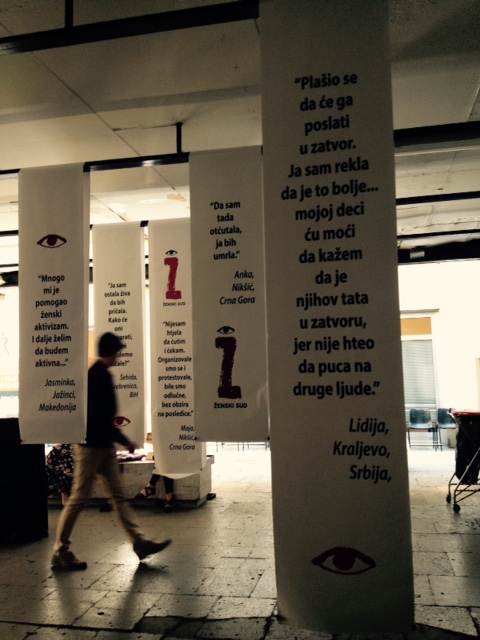
14.05.2015.
Kvinna till Kvinna :: Unforgettable testimonies at court for women survivors
”I am a heroine!” said one of the younger women who testified. She had survived a long period of sexual violence, rape and torture as a teenager in one of the rape camps, a more or less forceful and violent marriage, divorce and a new beginning. ”They took most of my childhood. They took my youth. But the present, and the future are mine.”
Last weekend, May 7-10, Women’s Court in Sarajevo gathered some 500 women from Bosnia and Herzegovina, Kosovo, Macedonia, Montenegro, Slovenija and Serbia, to testify and listen to witnesses and their personal life-stories about what happened during the Balkan wars in the 90s and thereafter – and how that affected, and still affects, women’s lives today.
The most powerful thing about the Court was that the women survivors and their testimonies were at the centre. They were made subjects, taking power of the space and of their own stories. The rest of us could only listen, and give our solidarity and standing ovations to their courage.
The process leading up to the Court has taken several years. As far as I know, the idea was first launched in 2001, and the work intensified during 2010. An enormous amount of work has been carried out in the last five years in each respective country as well as at the regional level.
And it has not been easy. There are different war narratives in different areas of the Balkans, there have been political developments like nationalism gaining ground, the process of the ICTY (International Criminal Tribunal for the former Yugoslavia) has been going on parrallelly – with too many war criminals set free, and many other developments and events that has influenced the process. At one point, women in Serbia could not find anyone willing to let them use their premises to hold meetings regarding the Women’s Court or reconciliation. These are just a few of the challenges. Personally, I was working for Kvinna till Kvinna in Serbia during 2011-2013, and this is when I followed the process closer.
Now, back to May 2015.

Quotes from women who have shared their stories during the process leading up to the Sarajevo Court. Photo: Kvinna till Kvinna/Maja Stajcic.
I think we have all heard stories from the Balkan wars in the 90s. About the ”rape camps”, ethnic cleancing, genocide. The wars – and the testimonies we heard – contained some of the utmost horrible and indescribable things that any human being could possibly do to another living soul, and hearing it directly from the surviving women made my entrails dissolve. And I am just an outsider.
There were also testimonies from mothers and wives of soldiers, women who tried to stop their husbands and sons from going to war and women who were desperately trying to get their family members back after they were drafted – even as minors.
In spite of everything, the feelings that most women projected were determination for peace and for justice – not vengence. For reparation, for safety, for a good future for them and their children, and for solidarity with all women, across all possible borders.
Giving power to the surviving women should be seen in contrast to a criminal tribunal, such as the ICTY, where the perpetrator is at the centre and the testimonies of the witnesses are heard in relation to the perpetrator. Thus, the witnesses will be answering questions and not be able to tell their whole story. Both processes are necessary, but fundamentally different.
After hearing more than 30 individual testimonies, many, many images and sentences stayed with me. One woman ended her testimony saying: ”We all live the consequences of the war.” This is true for the woman who is still looking for the remains of her oldest son, the woman who is still fighting to get her house back, the woman who was fired from her job because of her ethnicity and thus today has no pension, the Roma woman who’s rights are still utterly unprotected. And I cannot stop thinking about how everyone that I meet in the sunny streets of Sarajevo have their own personal story of what happened to them during the wars, and what they did. And how everyone is living the consequences.
Another quote I will never forget was from a woman whose children were pulled from her arms: ”I can forgive them for everything. I can forgive them for taking everything from us. But I cannot forgive them for taking our children.”
One woman said: ”In the end I had to pick sides, I became part of us and them.” But there were also many stories of resistance and humanity, of neighbours helping each other in spite of personal risks, of strangers helping people they had never met before. I think of the busdriver who saved a busload of women and children by telling the entering soldier (who wanted to kill them), that ”Yes, they will die, but you will not do it. I will see to it, now get out!” And then he drove them out of there, saving them, one of the women from the bus testified.
After each group of witnesses had spoken, a few so called expert witnesses – academics, activists and others, shared an analysis of the background, structures of war and of what happened, that gave a frame to the individual stories. For instance, it becomes obvious how gender structures were cemented. Almost none of the men in the women’s stories survived. The children and their survival (and physical and mental health) became the responsibility of the women – either because women and men were separated, or becuase women took that responsibility upon themselves.
The impunity is also widespread. Several women testified about perpetrators still being free – walking the streets of their home towns, or even holding political positions.
There is so much more to say, and even more that cannot be expressed by words. The resilient work of women human rights defenders and women’s organisations in the Balkans continues. And I believe that this solidarity between women is stronger, and so much more powerful, than the structures of criminality and violence. For us who are not part of the women’s movement in the Balkans, but part of the solidarity between women, remains to decide – in dialogue – how we best continue supporting this struggle for reconciliation.
– See more at: http://vipa.kvinnatillkvinna.se/regioner/balkan/unforgettable-testimonies-at-court-for-women-survivors#sthash.AeCOpxHp.X1hqmtXf.dpuf
















